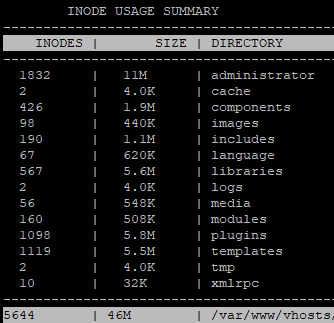#!/bin/bash
#
# @title inodes
# ------------------------------------------------------------------------------------------
# @author Myles McNamara
# @date 11/27/2013
# @version 1.7
# @source https://gh.smyl.es/inodes
# @description Check the amount of inodes (files) in a given directory.
# ------------------------------------------------------------------------------------------
# @usage ./inodes (-d|--dir) string [(-h|--help)] [(-t|--tree) integer] [(-e|--exclude) integer]
# ------------------------------------------------------------------------------------------
# @copyright Copyright (C) 2013 Myles McNamara
#
# This program is free software: you can redistribute it and/or modify
# it under the terms of the GNU General Public License as published by
# the Free Software Foundation, either version 3 of the License, or
# (at your option) any later version.
#
# This program is distributed in the hope that it will be useful,
# but WITHOUT ANY WARRANTY; without even the implied warranty of
# MERCHANTABILITY or FITNESS FOR A PARTICULAR PURPOSE. See the
# GNU General Public License for more details.
#
# You should have received a copy of the GNU General Public License
# along with this program. If not, see <http://www.gnu.org/licenses/>.
# ------------------------------------------------------------------------------------------
# Define help function
function help(){
echo "inodes - Count the amount of inodes in a given directory";
echo "Usage example:";
echo "inodes (-d|--dir) string [(-h|--help)] [(-t|--tree) integer] [(-e|--exclude) integer]";
echo "Options:";
echo "-h or --help: Displays this information.";
echo "-d or --dir string: Directory to scan and count inodes. Required.";
echo "-t or --tree integer: Show tree for directories with inodes above this number.";
echo "-e or --exclude integer: Exclude directory from report when below this many inodes.";
exit 1;
}
GET_SIZE(){
du -hs $1 |cut -f 1
}
GET_COUNT(){
find $1 |wc -l
}
SHOW_LINE(){
echo "------------------------------------------"
}
BLACK=$(tput setaf 0)
RED=$(tput setaf 1)
GREEN=$(tput setaf 2)
YELLOW=$(tput setaf 3)
LIME_YELLOW=$(tput setaf 190)
POWDER_BLUE=$(tput setaf 153)
BLUE=$(tput setaf 4)
MAGENTA=$(tput setaf 5)
CYAN=$(tput setaf 6)
WHITE=$(tput setaf 7)
BRIGHT=$(tput bold)
NORMAL=$(tput sgr0)
BLINK=$(tput blink)
REVERSE=$(tput smso)
UNDERLINE=$(tput smul)
clear
# Declare vars. Flags initalizing to 0.
# Execute getopt
ARGS=$(getopt -o "hd:t:e:" -l "help,dir:,tree:,exclude:" -n "inodes" -- "$@");
#Bad arguments
if [ $? -ne 0 ];
then
help;
fi
eval set -- "$ARGS";
while true; do
case "$1" in
-h|--help)
shift;
help;
;;
-d|--dir)
shift;
if [ -n "$1" ];
then
dir="$1";
SHOW_LINE
printf "[CONFIG] Directory to scan specified as $1\n"
shift;
fi
;;
-t|--tree)
shift;
if [ -n "$1" ];
then
tree="$1";
SHOW_LINE
printf "[CONFIG] Tree directories above $1 inodes\n"
shift;
fi
;;
-e|--exclude)
shift;
if [ -n "$1" ];
then
exclude="$1";
SHOW_LINE
printf "[CONFIG] Exclude directories below $1 inodes\n"
shift;
fi
;;
--)
shift;
break;
;;
esac
done
# Check required arguments
if [[ -z "$dir" && -n $1 && $1 != -* ]]
then
SHOW_LINE
printf "${RED}[CONFIG] Arguments not used, directory specified as $1 $NORMAL \n"
CURDIR=$1;
elif [[ -z "$dir" || "$dir" == "." ]]
then
CURDIR=`pwd`;
SHOW_LINE
printf "${RED}[ERROR] dir not specified, or invalid arguments, using $CURDIR $NORMAL\n";
else
CURDIR="$dir";
fi
# backup and change IFS to prevent problems with spaces in paths or file names
OLDIFS=$IFS
IFS=$'\n'
# New format for output using printf
format="%-10s | %-10s | %-20s\n"
header="${REVERSE}%-10s | %-10s | %-20s\n${NORMAL}"
treeformat="${CYAN}%-10s | %-10s | %-20s\n${NORMAL}"
SHOW_LINE
printf "\tINODE USAGE SUMMARY\n"
SHOW_LINE
printf "$header" " INODES" " SIZE" "DIRECTORY"
SHOW_LINE
for DIR in `find $CURDIR -maxdepth 1 -type d |grep -xv $CURDIR |sort`; do
COUNT=$(GET_COUNT $DIR)
SIZE=$(GET_SIZE $DIR)
# Check if exclude arg was used, and if so only output directories above exclude inode count
if [[ -z $exclude ]] || [[ -n $exclude && $COUNT -gt $exclude ]]
then
printf "$format" " $COUNT" " $SIZE" "`basename $DIR`"
fi
# Check for tree arg, and output sub-directory inode count if above tree parameter
if [[ -n $tree && $COUNT -gt $tree ]]
then
for TREEDIR in `find $DIR -maxdepth 1 -type d |grep -xv $DIR |sort`; do
TREECOUNT=$(GET_COUNT $TREEDIR)
TREESIZE=$(GET_SIZE $TREEDIR)
# Check for exclude arg on tree output
if [[ -z $exclude ]] || [[ -n $exclude && $TREECOUNT -gt $exclude ]]
then
printf "$treeformat" " --$TREECOUNT" " --$TREESIZE" "--`basename $TREEDIR`"
fi
done
fi
done
SHOW_LINE
printf "$header" "$(GET_COUNT $CURDIR)" "$(GET_SIZE $CURDIR)" "$CURDIR"
SHOW_LINE
# restore IFS
IFS=$OLDIFS
Output should be similar to this:

















